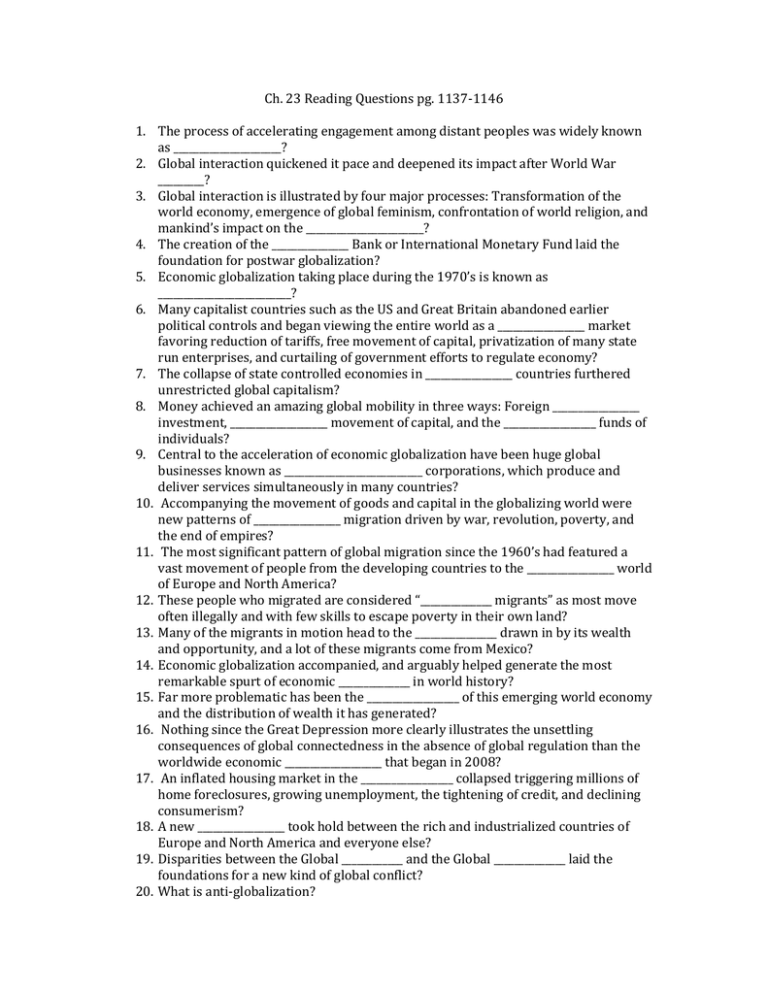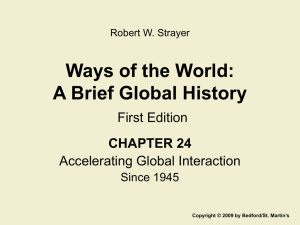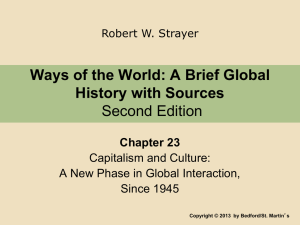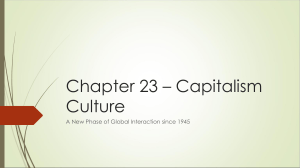Ch. 23 Reading Questions pg. 1137-1146
advertisement

Ch. 23 Reading Questions pg. 1137-1146 1. The process of accelerating engagement among distant peoples was widely known as _____________________? 2. Global interaction quickened it pace and deepened its impact after World War _________? 3. Global interaction is illustrated by four major processes: Transformation of the world economy, emergence of global feminism, confrontation of world religion, and mankind’s impact on the _______________________? 4. The creation of the _______________ Bank or International Monetary Fund laid the foundation for postwar globalization? 5. Economic globalization taking place during the 1970’s is known as __________________________? 6. Many capitalist countries such as the US and Great Britain abandoned earlier political controls and began viewing the entire world as a _________________ market favoring reduction of tariffs, free movement of capital, privatization of many state run enterprises, and curtailing of government efforts to regulate economy? 7. The collapse of state controlled economies in _________________ countries furthered unrestricted global capitalism? 8. Money achieved an amazing global mobility in three ways: Foreign _________________ investment, ___________________ movement of capital, and the __________________ funds of individuals? 9. Central to the acceleration of economic globalization have been huge global businesses known as ___________________________ corporations, which produce and deliver services simultaneously in many countries? 10. Accompanying the movement of goods and capital in the globalizing world were new patterns of _________________ migration driven by war, revolution, poverty, and the end of empires? 11. The most significant pattern of global migration since the 1960’s had featured a vast movement of people from the developing countries to the _________________ world of Europe and North America? 12. These people who migrated are considered “______________ migrants” as most move often illegally and with few skills to escape poverty in their own land? 13. Many of the migrants in motion head to the ________________ drawn in by its wealth and opportunity, and a lot of these migrants come from Mexico? 14. Economic globalization accompanied, and arguably helped generate the most remarkable spurt of economic ______________ in world history? 15. Far more problematic has been the __________________ of this emerging world economy and the distribution of wealth it has generated? 16. Nothing since the Great Depression more clearly illustrates the unsettling consequences of global connectedness in the absence of global regulation than the worldwide economic ___________________ that began in 2008? 17. An inflated housing market in the __________________ collapsed triggering millions of home foreclosures, growing unemployment, the tightening of credit, and declining consumerism? 18. A new _________________ took hold between the rich and industrialized countries of Europe and North America and everyone else? 19. Disparities between the Global ____________ and the Global ______________ laid the foundations for a new kind of global conflict? 20. What is anti-globalization? Ch. 23 Reading Questions pg. 1147-1154 1. An “__________________ Empire” some have argued is the face of globalization? 2. In some ways the ___________________ global presence might be seen as an “informal empire”? 3. American dominance has been termed an “empire of _________________” which uses its immense wealth to entice or intimidate potential collaborators? 4. When the US was attacked by Islamic militants on ___________________________ the military dominance of the US was unleashed? 5. Since the 1980’s the US faced growing economic competition. Accompanying this relative decline in economic production was a sharp reversal of the country’s trade balance as US __________________ greatly exceeded its _______________? 6. By the early 21st century the US international policies had generated widespread ________________? 7. The 1960’s witnessed an unusual convergence of protest movements around the world, suggesting the emergence of a global culture of _______________________? 8. In 1968 a new Communist Party Leadership in _________________________ led by Alexander Dubcek, initiated a sweeping series of reforms aimed at creating “socialism with a human face.” 9. In the 1960’s the icon of third world ideology was ___________________ the Argentinean born revolutionary who embraced Cuban revolution and attempted to replicate its experience of liberation through guerilla warfare in Africa and Latin America? 10. No expression of this global culture of liberation held a more profound potential for change than ________________? 11. The emphasis in the 1960’s on feminism and women’s rights was focused now on ________________ and education rather than voting rights? 12. Many women preferred ____________ action instead of political lobbying favored by equal rights feminists? 13. Many African governments and many African men defined feminism of any kind as “______________________” and associated with a hated colonialism? 14. Women’s movements in the global south took shape around a wide _______________ of issues, not all of which were explicitly gender based? 15. Feminism registered as a global issue when the _________________ under pressure from women activists declared 1975 International Women’s Year and the next ten years as the Decade for Women? Ch. 23 Reading Questions pg. 1155-1163 1. Buddhism, Christianity, and ______________ had long functioned as Trans regional cultures, spreading far beyond the place of origin? 2. No longer a primarily European or American religion, ____________________ by the early 21st century found 62% of its followers in Asia, Africa and Latin America? 3. __________________________ is a militant piety- defensive, assertive, and exclusive idea that took shape to some extent in every major religious tradition? 4. The _______________ and secular focus of global modernity challenged the core beliefs of religion, with its focus on an unseen realm of reality? 5. Although fundamentalism everywhere looked to the past for ideals and models, their rejection of ____________________ was selective not wholesale? 6. Extensive educational and propaganda efforts, political mobilization of their followers, social welfare programs, and sometimes violence were among the means _____________________ employed? 7. Derived in the US where religious conservatives were outraged by critical and scientific approach, they called for a return to the “fundamentals” of _________________? 8. The fundamentalist movement in India is known as ___________________? 9. This movement took political shape in the increasingly popular party called the ___________________________? 10. The most prominent fundamentalists of the late 20th century are of _______________ faith? 11. In 1967, Israel inflicted a devastating defeat on Arab forces in the ________________ War? 12. Leading figures India’s Mawlana Mawdudi and Egypt’s Sayyid Qutb insisted that the Quran and the ___________________ (Islamic Law) provide a guide for all life? 13. The effort to return to Islamic principles is labeled ____________, an ancient and evocative religious term that refers to struggle of striving to please God? 14. The earliest mass movement to espouse such ideas was Egypt’s __________________________? 15. Islamic revolutionaries took aim at hostile ________________ powers? 16. The ____________________ invasion of Afghanistan in 1979 prompted widespread opposition aimed at liberating the country from atheistic communism and creating an Islam state? 17. Osama Bin Laden created _________________ to funnel fighters and funds to Afghan resistance? 18. Al-Qaeda planned their attack on the ______________________ and other targets in the US on September 11, 2001? 19. In Turkey a movement inspired by the teachings of _________________, a Turkish Muslim scholar and preacher, has sought to apply principles of Islam? 20. “_________________ Theology” in Latin America sought a Christian basis for action in the areas of social justice, poverty, and human rights? Ch. 23 Reading Questions pg. 1164-1171 1. Three factors that vastly magnified the human impact on the environment are: the explosion of population, tap the energy potential of fossil fuels, and phenomenal _________________________? 2. The global spread of modern ____________________, heavily dependent on fossil fuels, created a pall of air pollution in many cities? 3. The release of chemicals thinned the _____________ layer, which protects the Earth from excessive ultraviolent radiation? 4. The most critical and intractable environmental transformation was __________________________? 5. Second wave environmentalism began in the West with the publication in 1962 of Silent Spring by ______________________? 6. The German environmental movement entered the political arena called the _______________________, with a focus on opposition to nuclear energy? 7. Environmentalism was more ________________ based than developed countries were? 8. In the _______________________, the focus was on protecting the foreign mining industry seeking to challenge established power structures? 9. The globalization of environmentalism also disclosed sharp _____________ between the Global North and the Global South? 10. Activists and governments in the ___________________ countries have often felt that Northern initiatives to address pollution would curtail their industrial development? Answers 1. Globalization 2. WWII 3. Environment 4. World 5. Neoliberalism 6. Single 7. Communist 8. Direct, short-term, personal 9. Transnational Corporations (TNC) 10. Human 11. Industrialized 12. Labor 13. US 14. Growth 15. Instability 16. Contraction 17. US 18. Inequality 19. North, South 20. International coalition of political activists, concerned scholars and students, trade unions, women organizations, environmental groups from rich and poor countries aimed at criticizing and counteracting globalization 1. American 2. US 3. Production 4. September, 11 2001 5. Imports, Exports 6. Opposition 7. Liberation 8. Czechoslovakia 9. Che Guevara 10. Feminism 11. Employment 12. Direct 13. Un-African 14. Range 15. United Nations Answers 1. Islam 2. Christianity 3. Fundamentalism 4. Scientific 5. Modernity 6. Fundamentalists 7. Faith 8. Hindutva 9. Bharatiya Janata Party (BJP) 10. Islamic 11. Six-Day 12. Sharia 13. Jihad 14. Muslim Brotherhood 15. Foreign 16. Soviet 17. Al-Queda 18. World Trade Center 19. Fethullah Gulen 20. Liberation Answers Answers 1. Economic growth 2. Industry 3. Ozone 4. Global Warming 5. Rachel Carson 6. Green Party 7. Locally 8. Philippines 9. Conflict 10. Developing




